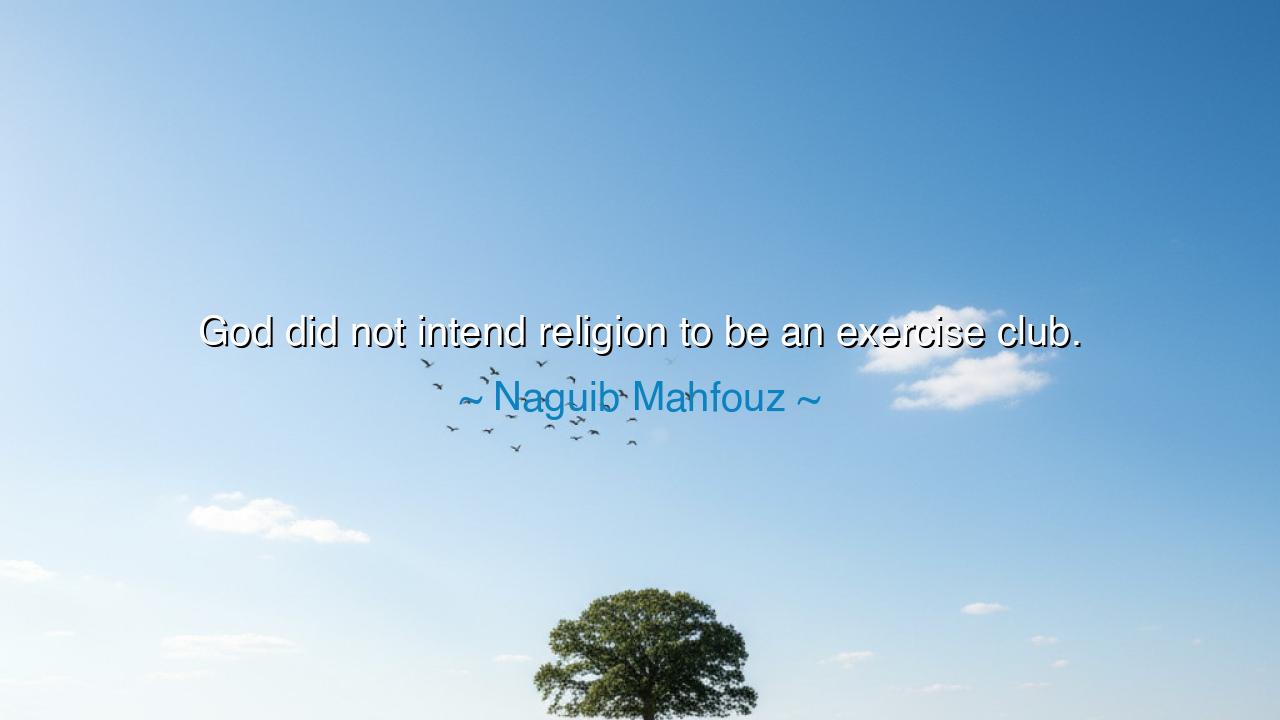
God did not intend religion to be an exercise club.






"God did not intend religion to be an exercise club." These words of the great Naguib Mahfouz carry with them the weight of both wisdom and a poignant warning. In them, he reminds us that religion, that sacred thread that ties together humanity's deepest questions and longings, was never meant to be reduced to something as superficial or as materialistic as physical fitness. The message here calls us to reflect on the nature of our spiritual lives and to ask ourselves: What is the true essence of faith? Is it merely about rituals, postures, or external appearances? Or does it call us to something deeper—something more profound, something that transforms us at our very core?
In the days of old, the sages would gather not to flex muscles or to compete in athletic feats, but to seek wisdom, to discuss the nature of the divine, and to guide the soul towards enlightenment. The ancient temples were places not of physical exertion, but of sacred reflection, of communion with the divine. In this light, Mahfouz’s quote beckons us to remember that religion is a spiritual journey, a pilgrimage of the soul, not a performance for an audience or an arena for exertion. Yet, in modern times, it is easy to forget this. Just as the Olympian games were once the crowning glory of physical prowess, so too has religion in many cultures become an outward display—one of rituals, of perfect appearances, and of the compulsion to conform to social expectations.
Consider the example of the Pharisees from the scriptures. These men were known for their outward displays of piety—fasting, praying, giving alms—all performed with the utmost precision, to ensure they were seen as holy by the people. Yet, in their hearts, they were empty. The outward gestures, though impressive, lacked the essence of love, compassion, and humility that were the true teachings of the faith. Jesus, with his unparalleled wisdom, rebuked them, teaching that religion is not about the outer performance but about the condition of the heart—about the inward transformation of the spirit.
This same principle rings true in the words of Mahfouz. When religion becomes a performance, a series of actions or appearances meant to prove one’s piety, it loses its true purpose. It becomes like an exercise club, where members gather not for the sake of spiritual elevation but for the sake of physical exertion—a fleeting pursuit, one that ultimately brings no lasting peace or fulfillment. The true purpose of religion, as Mahfouz reminds us, is to guide the soul, to lead us to compassion, wisdom, and connection with the divine. It is meant to be a source of inner peace, not a ritualized competition or a display of self-righteousness.
The ancient mystics and prophets were often more concerned with the heart's intentions than with the outward appearance. The Prophet Muhammad, peace be upon him, said, "God does not look at your bodies or your appearances, but He looks at your hearts and your actions." Similarly, the Buddha spoke of the need for inner peace, advising that the way to liberation lies not in external rituals but in the calming of the mind and the cultivation of virtue. In these teachings, we see a profound truth: religion is about the state of the soul, not the performance of rituals or the exertion of physical effort.
In more recent times, we see how easy it is to fall into the trap of turning religion into something transactional, like a membership to a club. We check the boxes of prayer, charity, fasting, and so on, but we forget the deeper purpose of these acts. The outward rituals are meant to bring us closer to God, to soften our hearts, and to sharpen our awareness of the divine presence in our lives. They are not meant to be a competition to see who can perform them most perfectly or most visibly. Rather, they are a means by which we can transform ourselves, and through this transformation, help others and foster a more just, loving, and humane world.
Let us take the lesson that Mahfouz imparts and apply it to our own lives. We must examine our spiritual practices: Are we performing them out of genuine devotion, or are we simply going through the motions to satisfy social expectations or to gain approval? The actions we take—be it prayer, charity, or fasting—are meant to purify the soul and draw us closer to the divine, not to make us feel superior to others. Thus, we must always return to the heart, to the intention behind our actions. Religion is not an exercise club, it is a journey towards self-discovery, towards divine truth, and towards a life that is rooted in love, compassion, and service to others.
In the end, the message is clear: let us not be fooled into thinking that the outward display of faith is enough. Let us seek the deeper, transformative power of religion—one that begins within and ripples out to touch the lives of others. Just as the ancient sages taught, it is not enough to wear the robe of righteousness; we must ensure that our hearts are pure, that our actions are driven by compassion, and that we seek to build a world of peace. Religion, at its core, is a path of inner growth, not an outward exercise. May we tread it with humility and wisdom, knowing that the greatest strength lies in the purity of our hearts.






AAdministratorAdministrator
Welcome, honored guests. Please leave a comment, we will respond soon